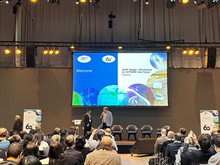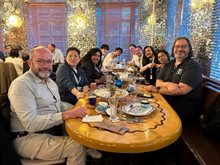A milestone for 6G in Rotterdam
The Netherlands hosted a landmark event for 6G last week: the 3GPP Workshops in Rotterdam. During three days, more than 500 representatives from all over the world shared their views on 6G requirements and use cases. This laid the first foundation for the 6G specification that will be developed in the coming years.
Future Network Services is proud that this first 6G milestone took place in the Netherlands and that we were able to make our contribution to the European R&I vision (SNS) and the use cases (5GACIA Industry, 5GAA Automotive, NGMN Operators). The FNS input during these three days focused, among other things, on the high-tech industry, road safety for cyclists/pedestrians (Vulnerable Road Users) and the multi-edge cloud.
Day 1: Opening, operators, verticals
The first day of the 6G use case workshops featured operators and verticals. In the next decade, mobile technology will play a hugely important role in global society and in the vertical session, the message was that there is still much to be done to deliver on the promises of 5G. While 5G has foreshadowed several applications, the market lags significantly behind it. It is important to be confident that this is going to be different for 6G from day 1. In addition, a strong sound was that mobile technology needs to be developed in such a way that society can rely on it for its digital future. Day 1 ended with the Operator Dinner.

Day 2: Research alliances
On the second day of the 3GPP SA1 workshops, the research initiatives B5GPC (Japan), 6GForum (Korea), IMT2030 Promotion Group (China), Bharat 6G Alliance (India), Next G Alliance (North America) and SNS (Europe) presented their views on 6G use cases. Compared to the presentations by operators and verticals on the first day, the research initiatives see very many technological opportunities. In addition, they relate how the technology should help in addressing societal challenges at play in India (digital divide) or Japan (population shrinkage). The researchers are not only looking at traditional KPIs such as speed and latency, but rather KVIs (key value indicators) that should test the technology for sustainability. For consumers, the common thread was to foresee wide adoption of XR applications at numerous times. In B2B2C applications, sensing from the network stands out as a new feature, which can be widely applied in road safety. Finally, to achieve coverage everywhere also in disasters, satellite was mentioned by all initiatives.

Day 3: ITU, 3GPP, conclusion
On the third day, the 3GPP Stage-1 Workshop concluded with presentations from ITU (sets the requirements from UN what qualifies as 6G) and 3GPP (on the timeline of standardisation), followed by a summary of the workshop. By the way, the presentation are available to all via the following link.
Future
Ultimately, 5G has yet to really mature in the coming years to fulfil its promises. 6G is only going to create new capabilities and scale in the period after that (from 2030 onwards) that will no longer fit in 5G. FNS is actively involved in the development of the 6G standard, because very good technology or applications can only become successful when they have a place in the standard. The next big milestone is an architecture & interfaces workshop where research initiatives from around the world will share their vision on how to flesh out all the use cases.
